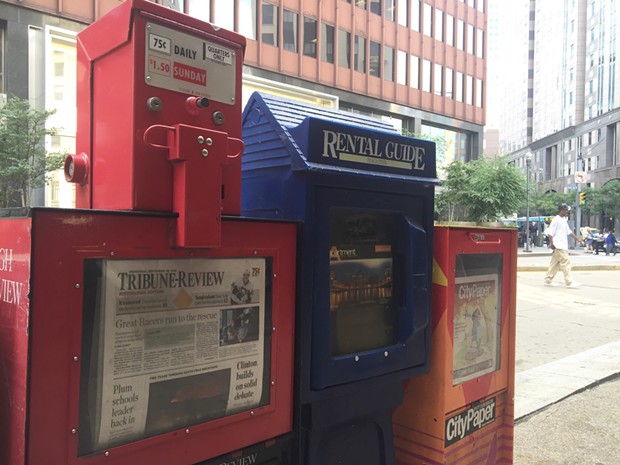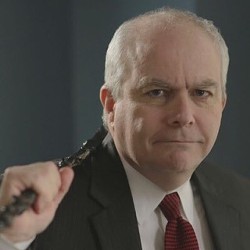Dennis Roddy on the death of the Pittsburgh Tribune-Review's print edition
"As a journalist I can find nothing good about the disappearance of even a bad newspaper, much less one so simultaneously luminescent and toxic as was The Trib."
The Pittsburgh Tribune-Review is now receding into the past, its most talented staff dispersed, top editors handed their walking papers, and its sprawling offices in the D.L. Clark Building resembling the aftermath of a plague.
All the equipment is where it belongs. The people have vanished.
As a journalist I can find nothing good about the disappearance of even a bad newspaper, much less one so simultaneously luminescent and toxic as was The Trib.
I began my career in daily newspapers at The Tribune-Review when it was entirely a Greensburg, Westmoreland County, newspaper. Richard Mellon Scaife, the legendarily right-wing publisher, had already established a reputation for imperiousness and messing with news content.
That is to say that Dick Scaife was like every publisher I ever met. A.J. Liebling long ago observed that, “Freedom of the press is guaranteed only to those who own one.” A generation ago, that was true. It was equally true that everybody has to start somewhere, and the Tribune-Review of the 1980s was fertile ground for young ambitions. Some of my best work was done at the Trib, as was some of my worst. The magic of the place was that it allowed ambitious young reporters to fail as well as succeed.
Scaife treated me very well, and his conservatism did not alarm me. I was, in those days, much under the spell of the conservative intellectual movement, drawn to it mostly by the fact that it was offering new ideas and theories where liberalism had become a set of rote and narrow formulas. What I could not stand was his inability to distinguish between news and opinion, which often led the Trib into petty vendettas.
When I left in 1986, I appreciated the opportunities The Trib had given me and regretted only that its publisher’s high-profile politics and occasional outbursts meant that while it would always be an interesting newspaper, it would never be a great one.
The Pittsburgh Tribune-Review was conceived in a fit of pique, when Richard Mellon Scaife was blocked from purchasing The Pittsburgh Press at the end of the strike that killed the latter paper. An angry billionaire can be an entertaining spectacle, but a disruptive one. The plain fact is that Dick Scaife hated the Block family. That is why there was a Pittsburgh Tribune-Review.
The problem with The Tribune-Review was that it wished its stories to be true. Often they were. In the case of reporters such as Carl Prine, Andrew Conte and its renowned state-capital correspondent, Brad Bumsted, the stories were not only true but excellent. In the 24 years of its existence, The Pittsburgh Tribune-Review broke important stories and in the past decade it frequently embarrassed its more established crosstown rival, the Post-Gazette.
This is how the work of legitimate reporters ran in the same paper that carried the overwrought conspiracy theories of Christopher Ruddy, who made the Trib famous for outlandish suggestions that Clinton aide Vince Foster and U.S. Secretary of Commerce Ron Brown were murdered. The editorial page became a fetid sinkhole of hate and stupidity. Sam Francis, a self-described “white nationalist,” was given a weekly spot. Insults became more important than insights. Attention-seeking seemed to be the operative policy. Opinion editor Colin McNickle once got into a “literary feud” with the editors of the Mount Lebanon High School student newspaper.
From an editorial implying that Katherine Graham murdered her husband to Eric Heyl’s artless insult of Wilkinsburg’s displaced high school students, the page was one, vast overreach – both unfounded and unfunny.
The good work of legitimate journalists was forced to reside in the same smelly stable with McNickle, Christopher Ruddy and the anonymous authors of the Whispers column. Too often, people were buying the paper for the wrong reasons. This is understandable. Its owner was publishing it for the wrong reasons.
My reporting nine years ago – for which Scaife had me hauled into court – showed what everyone suspected all along. The Pittsburgh Tribune-Review might have championed the creative destruction of the free market, but its billionaire owner had been born free of the laws of supply and demand. The paper lost tens of millions annually and Scaife’s death proved that, in some cases, you can take it with you when you die.
The Pittsburgh edition will now become a bureau. Circulation, long sustained by budget pricing gimmicks, will drop. The Trib will, once again, be a Greensburg paper.
The retrenchment was inevitable and regrettable. Ordinarily, when a rambunctious publisher dies, the paper trims its course and moves on. Robert McCormick died and The Chicago Tribune matured into a great paper. Likewise, when the elder Chandlers passed, The Los Angeles Times transformed from a so-so regional money factory to a publication of national import.
The difference here is that these publishers were wealthy because of their newspapers. Scaife was wealthy in spite of his. With that difference now laid bare, the experiment ends. It ends in an era in which freedom of the press now means little more than having an opinion and owning a laptop computer.
We now have freedom of the press. We just don’t have the press to go with it.
Dennis Roddy is a former reporter with the Pittsburgh Post-Gazette and Tribune-Review. He also served as a spokesperson for Gov. Tom Corbett.



















